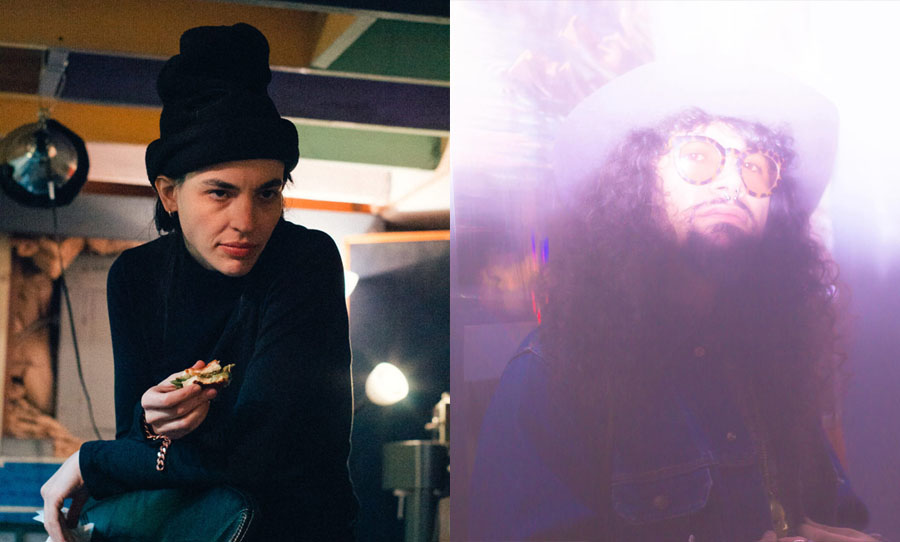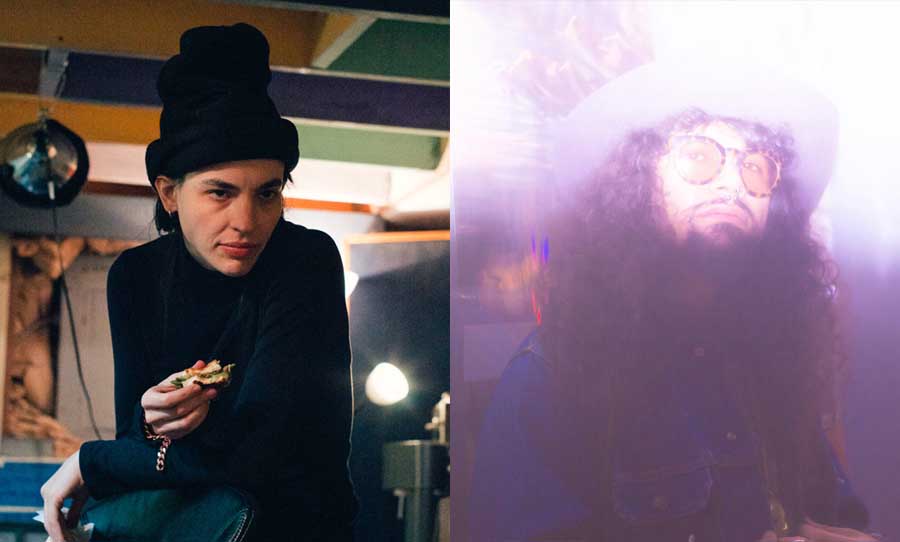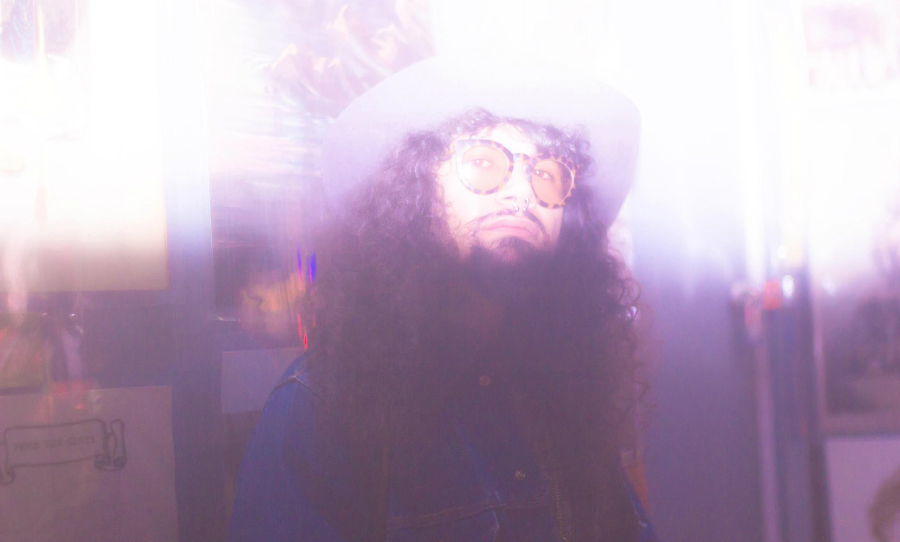Eva Lawitts is the frontperson of Stimmerman, a bass player for Citris, Oceanator, Princess Nokia, Rotem Sivan, Three Body Problem, Vagabon, and more, plus the co-founder of Brooklyn’s Wonderpark Studios. Her longtime friend and high school classmate is Evan-Daniel Rose-González, known to us by his musical pseudonym Silica Angel.
To celebrate their recent releases (Silica Angel’s self-titled single and Stimmerman’s Pleasant Vistas in a Somber Place), the two sat down for a lengthy chat about anything and everything.
This interview has been heavily truncated; an extended but still truncated version of the interview can be found here.

Longtime friends Silica Angel and Stimmerman’s Eva Lawitts discuss the dark web, Degrassi, throwing up blood and much, much more.
On their shared experience at performing arts high school
EVA: We met at [Fiorello H. LaGuardia High School of Music, Art and Performing Arts], right? So, do you feel that doing that sort of thing, going to a specialised music school at a young age, and learning music theory, and being […] compelled to learn instruments and have some sort of classical training […] do you feel like the environment of that place has hindered you or helped you in any way?
EVAN-DANIEL: I think it was definitely a boon to me more than it was detrimental to me. I mean, I definitely have a lot of trauma from my time there […]— but one thing LaGuardia brought out was just […] my competitive energy, and that’s what I was missing. […] I always felt that need to prove myself, and that definitely never went away. […] The philosophy I developed at LaGuardia [was] no matter how weird it is, as long as it’s good, people won’t ignore it. Of course, I didn’t get to that point at LaGuardia — I was making pure garbage.
EVA: I don’t think I was really aware that you were making any sort of electronic music at LaGuardia.
EVAN-DANIEL: I wasn’t, until, like… the last three months. […] [I had a] Microkorg and a mic, and I just did this weird […] banshee screaming thing, for around… 30 minutes? […] I made a little beat—[…] I think I beatboxed, actually, and then put some distortion on it.
EVA: I would actually be kind of interested to hear what that sounds like.
EVAN-DANIEL: It’s just, like, this very […] avant-noise… thing.
On Pauline Oliveros
EVA: Talk a little bit more about her [Pauline Oliveros], because I don’t know anything about her except that she was your mentor, and she passed away recently.
EVAN-DANIEL: Yeah, she passed away in 2016. She was a contemporary to Terry Riley, John Cage — she pioneered the Deep Listening philosophy, which is […] largely about listening to the environment as an instrument, listening to the different components of the environment as instruments and just regarding every sound as sound, as viable sound to either be used; or listened to; or just interacted with as music. It’s a very cerebral philosophy.
EVA: Well, I mean, not only does that explicitly suit you, but I think very cerebral philosophies suit you [laughs].
EVAN-DANIEL: It definitely is the reason that the music I make sounds the way it sounds now. She was really at the forefront of everything. With Pauline, I remember I would always bring her textbooks and things I wanted to study, and she’d always be like, “Oh, yeah, I taught them.” […] My thesis was centred on physicalisation and sonification of brainwaves, using the Subpac, and when she […] felt the low frequencies of her alpha waves vibrating, she just looked at me and said, “Hmm. Feels about right!” It was […] such a privilege just to be able to be in her presence at all, let alone to get to know her on both a mentor/mentee level and on a friend level.
On technology
EVAN-DANIEL: The only thing I know how to do with technology is make sounds with it.
EVA: Yeah […]. I know, like, nothing about what you do. I don’t know what software you use, what hardware you use […] how you create anything.
EVAN-DANIEL: Well, I swore off hardware recently. […] I’m all laptop now, one controller, and I just use the Ableton Push 2 and Ableton […] — for the most part, my whole philosophy is based around breaking Ableton. […] Getting Ableton to freeze, but still be working enough for me to record what’s happening […]. I’m breaking the product, and using it entirely how it’s not meant to be used.
EVA: Interesting. Is that a thing that’s done? […] Is that, like, your hint of madness, or is that something that people do?
EVAN-DANIEL: I was inspired by seeing someone else advertising a seminar on how he does it, but I didn’t actually make it out to that seminar […] — so all I had to go from was the headline, which is often how I get my inspiration […]. So I was like, “I could break Ableton,” and then I found my own ways to do it. I use it in a very specific ‘sound collage’ sort of way.
On the Dark Web
EVAN-DANIEL: I remember the first time I went on the dark web.
EVA: Yeah?
EVAN-DANIEL: Saw a grenade launcher for sale.
On early influences
EVA: At the end of the day you’re always going to sound like what you listened to when you were, like, ages 13 to 16. It’s why everything Chris writes kind of sounds like Blink 182, even when it doesn’t, and like why everything I write sounds a little bit like System of a Down even though I’m trying really hard to make it not sound that way.
EVAN-DANIEL: That’s why everything I write sounds like The Mars Volta being played through a computer that went through the washing machine.
On chance music
EVA: What’s your relationship to the world of chance music?
EVAN-DANIEL: Very, very love-hate. […] My process involves a little bit of it, because I’ll set up randomizers on my drums or something, or I’ll set up randomizers on a chord progression. I feel like it does add a little more life to what I’m doing […], but I would never do it as the only element of a composition. I’m too anal about control and consistency for that […]. My problem is that I never sample it out and have it recorded, so then I end up having to just keep recording bounces with randomization over and over again, until it sounds right.
EVA: Just rolling the dice, over and over again, until you get the same combination. That’s so crazy. That’s, like, the definition of insanity.
EVAN-DANIEL: That’s […] definitely one place where having extreme OCD comes into play for my work.
On fashion choices
EVAN-DANIEL: I keep buying basketball jerseys with nonsense printed on them.
EVA: Yeah, I’m a big fan of those, as you know.
EVAN-DANIEL: I always wanted to ask you where you get all of yours.
EVA: Burma.
EVAN-DANIEL: Okay. I can’t make that trip.
On musical philosophy
EVA: What do you feel is […] the balance of who you’re creating things for? Because I feel like there’s creating things for yourself; creating things for an audience, which is very hypothetical, like…’The Audience’; or creating things for your peers. I mean, if you were in a band, I would say your bandmates, but you’re not. [laughs] […] So I guess your peers, whoever those are.
EVAN-DANIEL: I’m trying to create things for people… like me, in a lot of ways? […] I’ve just… felt like I’ve been running for 25 years. I just feel, like, this constant sprinting feeling, and this constant rushing energy. […] And I feel like my music is largely a reflection of that and a response to that, almost, because a lot of it is very slow and very droney. […] I think above all I’m creating for myself, because I feel like […] I can only create something that I would want to listen to.
EVA: I’m discovering that definitely not everybody thinks that way as much as I would prefer that they did. But I think that’s my ideal approach to music, right? That you’re creating something that’s therapeutic for yourself, but also vaguely in the hopes that you can do some kind of service for somebody else by, you know — creating it for some anonymous listener.
EVAN-DANIEL: I also definitely value technicality […], so a large part of my audience is… not a certain type of person who listens to any certain type of music, it’s just anyone who can appreciate something that’s done well, whether or not it’s to their particular tastes.
On Degrassi
EVAN-DANIEL: I watched 700 episodes of Degrassi.
EVA: Everyone has been telling me about Degrassi. I feel like I missed out on Degrassi.
EVAN-DANIEL: I didn’t watch it as a child; I missed out as well. But I got started on it last year, on the recommendation of my friend who also watched it as an adult.
EVA: Princess Nokia recommended it to me. [laughs]
EVAN-DANIEL: I’ve never watched the original Degrassi […], but I’ve watched everything from Degrassi: The Next Generation, the one Drake is in, going forward.
EVA: Is it really called The Next Generation, like Star Trek?
EVAN-DANIEL: Yes.
EVA: [laughs] Why would they call it that? That’s so confusing!
On the creative process, and integrity
EVAN-DANIEL: I found a predictive text app, and I loaded a bunch of Degrassi scripts into it, and I’ve been writing my own.
EVA: I feel like my musical… path that I’ve been on, right, has been — my main thing that I like, and I think the main thing that I’ve always liked — […] it’s been, like, making stuff, and […] I feel like I’d be better suited, maybe, to a lifestyle where I could just make crazy bullshit and let it inform what I’m doing more, you know? Like making predictive text Degrassi episodes and having it inform my music making. But, instead, I’ve sort of arrived at this place where I’m doing a lot of gigslut, hired gun type of things […], and I feel like you’re in a world where it’s impossible, from my perspective at least, to take what you do and pander to an audience with it, you know what I mean?
EVAN-DANIEL: I mean, I’ve tried. [laughs] But every time I write music, I black out. And I’ll come to when it’s done, basically […].
EVA: When you think about blacking out […], do you think that that’s kind of like a phenomenon of the creative mind or something, or do you think there’s […] a spiritual dimension to it? Bach, for instance, experienced the same thing, but he explained it as being a religious experience […]. That God wrote his music, and he wasn’t conscious for it.
EVAN-DANIEL: I definitely think there are things in life that are spiritual things, but I’ve never had that with music. It’s always been very internal, very cerebral, very insular, very just… within myself.
On Smash Mouth
EVAN-DANIEL: I went and saw Smash Mouth on the 4th of July, up in Albany.
EVA: How was it?
EVAN-DANIEL: They were…really tight.
EVA: They’re… kind of good? They’re, like, actually, like, Astro Lounge… okay. Maybe we won’t include this in the actual interview, but Astro Lounge is a great album.
EVAN-DANIEL: That’s going to be the tagline of the interview. [laughs]
EVA: To quote Chris Krasnow (co-owner of Wonderpark Studios, guitar player in Stimmerman, Citris), Astro Lounge is Smash Mouth’s Crack the Skye.
On self-expression
EVAN-DANIEL: Troy is the place where I first felt like I could get as weird as I wanted, and that was part of why I came back up here […]. When I came up here as a freshman in college […], I was… a very ‘normal’ looking kid. And everyone still looked at me like I was this fucking unicorn. As soon as that hit me, I was like, “Oh, it doesn’t matter what I do!” So I just took it to the extreme. […] And in the city, I feel like there’s a little more scrutiny, just as far as, like, being able to try things.
EVA: I think you’ve sort of touched on something that a lot of people overlook; […] New York is heralded as this place where you can do whatever you want, and I think that’s sort of like one of the great cliches about New York […], no one’s going to care. And I think the truth is that lots of people care, and lots of people are extremely judgmental, and that, if anything, New York forces you to pigeonhole yourself more than a place with less of a scene.
On when to worry if you’re throwing up blood
EVA: I seem to recall there being, like, a pervasive issue with you throwing up blood.
EVAN-DANIEL: I have these, like, hacking coughs that cut up my throat. At first I was worried about it, and then I realided if the blood is fresh, I’m good. If the blood is fresh, that just means it’s cuts. […] As long as there’s no internal bleeding, I’m not complaining. That’s the other tagline.
EVA: [laughs] Yes. How would you know if there is any internal bleeding?
EVAN-DANIEL: If it’s a dark, like, sanguine, color. That’s when you know that that bleeding’s been in there for a minute.
EVA: Sanguine hack.
EVAN-DANIEL: I would not be shocked by internal bleeding, because I mostly only eat Airheads.
EVA: I feel like self-destructive artists are not a rare breed, but I feel like you’re a rare breed of self-destructiveness.
EVAN-DANIEL: Thank you!
On performance
EVA: How do you see your relationship to performance? Because I think of your music as being kind of antithetical to performance, but I’ve also seen you perform several times and [laughs]… I like it! So, I don’t know — because for me, the end goal is performance […]. I feel like I almost make albums as advertisements for shows, which I feel like is almost definitely not the case for you.
EVAN-DANIEL: It’s the exact opposite. My shows are an advertisement to listen to my album. With performance, it’s always a compromise for me. I write headphone music. It’s in ‘3D audio,’ […] and I pay extra attention to where in the sonic space sounds exist. I feel like I’m conducting, more than anything — giving directions to different groups of instruments.
On Daughtry
EVAN-DANIEL: Oh my God. I just remembered that I meant to start this whole thing like, “So we’re talking about my new role in famed alt-rock band Daughtry!” I was going to start this whole thing off like that, and I completely forgot. I was going to say that I was going to be replacing Daughtry himself, and I was going to be the new Chris Daughtry.
EVA: Can I hear your Daughtry?
EVAN-DANIEL: My Daughtry? Um… I don’t know any Daughtry songs.
EVA: [laughs] I don’t know any Daughtry songs either.
On the future (take one)
EVA: Plans for the future: will you be on The Real World?
EVAN-DANIEL: That’s my backup plan. I had one semester, when I was in school, where I watched… 16 seasons of The Real World.
EVA: Yeah. [pauses] What?
EVAN-DANIEL: That’s the real goal—to get my music on The Real World.
EVA: I think you’re a perfect candidate, and I think if you constantly have your own music blaring at all times, so that other people’s interviews and confessions are drowned out — I think that’s ideal.
EVAN-DANIEL: Then when they need to buy the rights to it […], I’d be on the other end, like […] “You kicked me off the show for breaking the rules of The Real World, and now you want to buy my music?”
EVA: That’s so weird, because I feel like your music is… good. Like, I like it, but I feel like you’re only influenced by terrible, terrible things. […] Like, I don’t totally understand… how bad things go into you and good things come out.
On the future (take two)
EVAN-DANIEL: Oh, we should probably plug the show that we’re playing together. […] Also, just to be clear, who’s in your band right now?
EVA: Okay! So the band… it’s a weird one. I’m trying to keep it so that it’s me, Chris, Russell [Holzman, who has served as the touring drummer for Beach Fossils] and [trumpeter] Adam [O’Farrill]. […] When I come up there, it’s going to be me, Chris, and Ethan [Meyer], the drummer from Three Body Problem.
EVAN-DANIEL: Awesome. I’m so excited. Anyway, thank you so much for doing this!
EVA: Thank you, it was super fun! Well, I’ll see you in like a month or whatever.
Silica Angel, Stimmerman, and Rotem will be sharing the stage — along with Austin, TX band BUHU — on October 25th at River Street Pub, in Troy, NY, as part of Super Dark Collective’s Super Dark Thursday series.
They’re also working on a collaborative album, which will be out… eventually.


